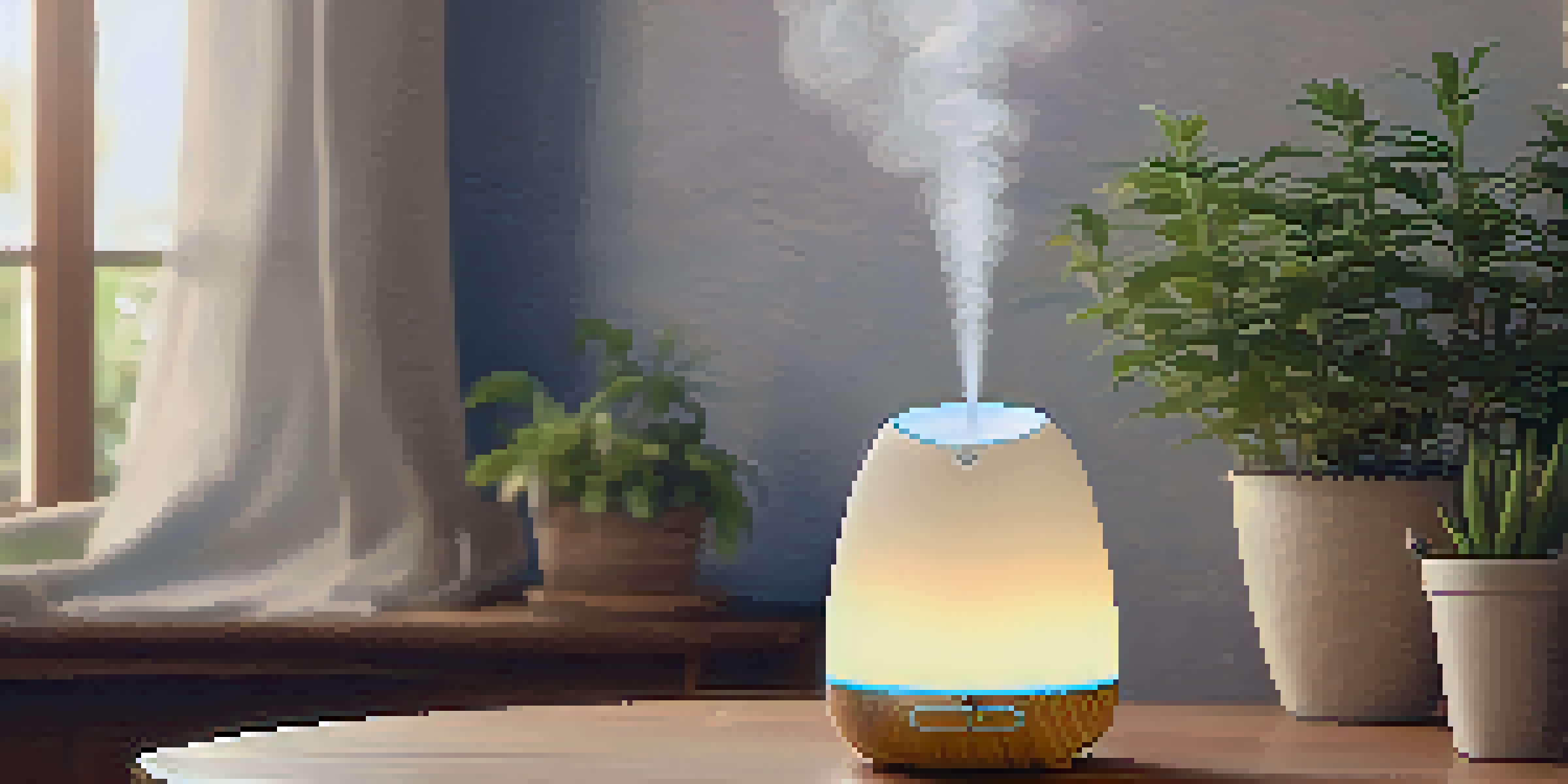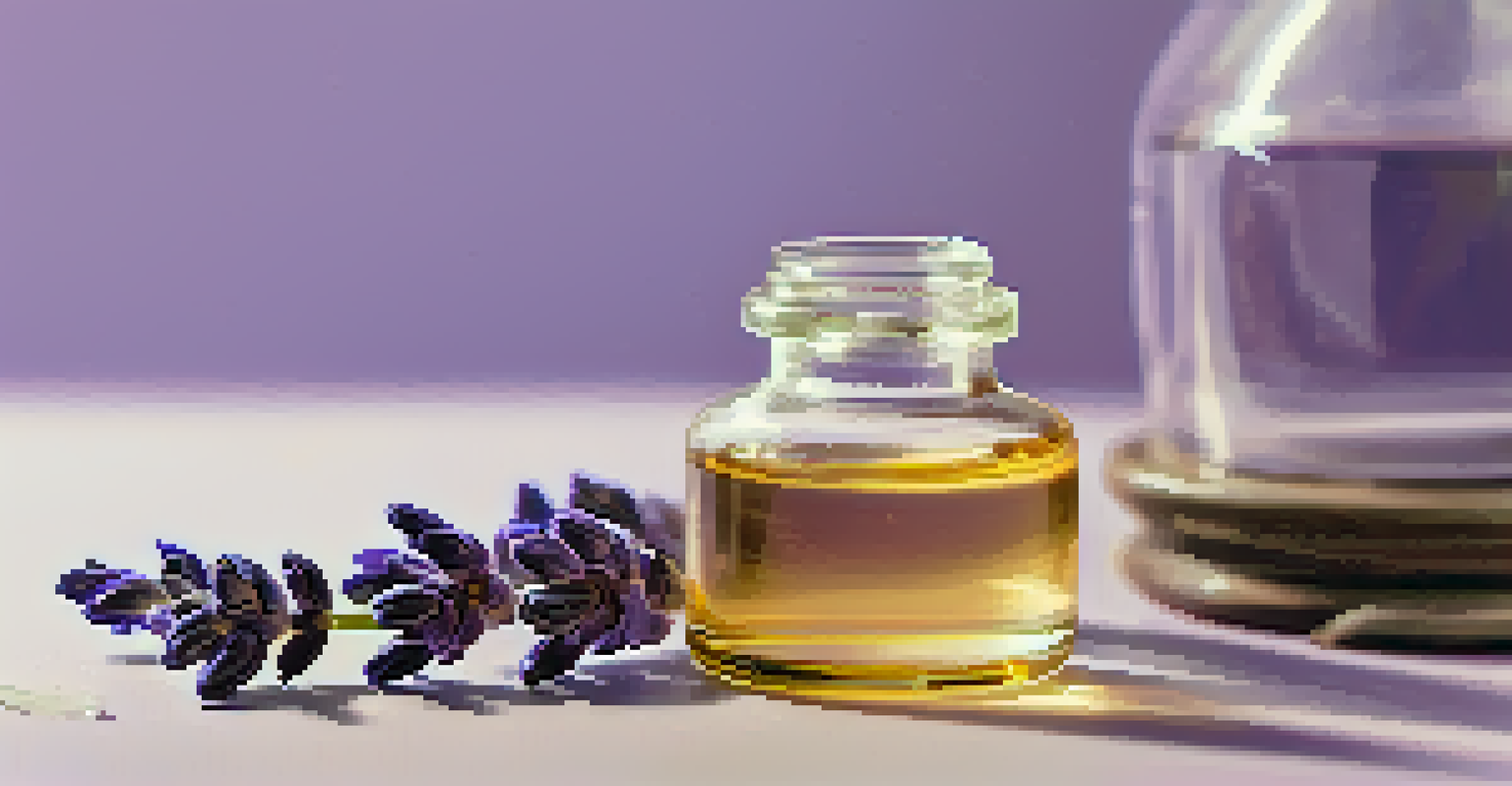Exploring the Benefits of Aromatherapy in Holistic Health

Understanding Aromatherapy and Its Origins
Aromatherapy is a holistic healing practice that utilizes essential oils derived from plants to promote physical and emotional well-being. The roots of aromatherapy can be traced back thousands of years to ancient civilizations like Egypt, where aromatic oils were used in religious rituals and for medicinal purposes. Today, this practice has evolved, integrating modern techniques with traditional wisdom to create a powerful tool for healing.
The use of essential oils can be a wonderful way to support your well-being, both physically and emotionally.
Essential oils, the heart of aromatherapy, are concentrated extracts that capture the natural fragrance and properties of plants. Each oil has its unique benefits, such as lavender for relaxation or eucalyptus for respiratory support. Understanding these oils and their uses is key to harnessing the full potential of aromatherapy in your daily life.
In modern holistic health, aromatherapy is often combined with other practices like massage, meditation, and yoga. This synergy enhances the overall experience, promoting a deeper state of relaxation and mindfulness. By exploring aromatherapy, individuals can tap into a rich tradition that supports their journey toward wellness.
Promoting Relaxation and Reducing Stress
One of the most celebrated benefits of aromatherapy is its ability to promote relaxation and reduce stress. Scents like chamomile and bergamot can trigger the body's relaxation response, calming the mind and easing tension. When inhaled, these aromas send signals to the brain, helping to lower cortisol levels and create a sense of peace.

Incorporating aromatherapy into your daily routine can be as simple as using a diffuser or adding a few drops of essential oil to your bath. This practice not only enhances your environment but also provides a moment for self-care amidst a busy day. Imagine coming home after a long day and filling your space with calming scents; it’s a simple yet effective way to unwind.
Aromatherapy for Relaxation
Aromatherapy uses essential oils like lavender and chamomile to promote relaxation and reduce stress.
Moreover, studies have shown that aromatherapy can improve sleep quality. Oils like lavender and cedarwood help create a soothing atmosphere, making it easier to fall asleep and stay asleep. By prioritizing relaxation through these scents, you can enhance your overall well-being and resilience to stress.
Enhancing Mood and Emotional Well-being
Aromatherapy is also a powerful ally in enhancing mood and emotional health. Scents such as citrus oils like lemon and orange are known to uplift spirits and energize the mind. By simply inhaling these fragrances, you can feel a boost of positivity, making it an excellent tool for combating feelings of anxiety or sadness.
Aromatherapy is not just about scents; it's about the deep connection between our mind, body, and spirit.
Creating an uplifting environment with essential oils can be an enjoyable ritual. Whether it’s a morning routine that includes diffusing uplifting scents or a mid-afternoon pick-me-up with a refreshing aroma, these small changes can significantly impact your mental state. Think of it as a natural way to elevate your mood and bring joy into your day.
In addition, aromatherapy can support emotional healing by helping to release negative emotions and promote a sense of balance. Oils like frankincense and rose are often used during meditation or mindfulness practices to deepen emotional exploration. This connection between scent and emotion can lead to profound personal insights and healing.
Supporting Physical Health and Wellness
Beyond emotional benefits, aromatherapy also plays a significant role in supporting physical health. Essential oils can have antimicrobial properties, aiding in the fight against bacteria and viruses. For example, tea tree oil is renowned for its purifying qualities and is often used in skincare to treat acne and other skin conditions.
Additionally, certain oils can help alleviate physical discomfort. Peppermint oil, for instance, is often used to relieve headaches and nausea. By applying diluted peppermint oil to your temples or inhaling its refreshing aroma, you may find relief from tension and discomfort in a natural way.
Boosting Mood with Scents
Citrus oils, such as lemon and orange, can uplift spirits and enhance emotional well-being.
Using aromatherapy as a complementary therapy can enhance traditional medical treatments. Many individuals find that incorporating essential oils into their healthcare regimen not only provides relief but also empowers them to take an active role in their wellness journey. It's a reminder that health is not just about medication; it's about a holistic approach to well-being.
Boosting Cognitive Function and Focus
Aromatherapy can also enhance cognitive function and focus, making it a fantastic tool for studying or working. Essential oils like rosemary and peppermint are known to stimulate the mind and improve concentration. The invigorating scents help clear mental fog, making it easier to tackle challenging tasks or retain information.
Incorporating these oils into your workspace can create a more productive environment. A simple diffuser or a roll-on blend can keep your mind sharp and alert throughout the day. Imagine studying for an exam or working on a project while surrounded by uplifting scents; it can transform your experience and boost your efficiency.
Furthermore, research suggests that certain aromas may enhance memory recall. By associating specific scents with study sessions, you can create a mental link that aids in remembering information later. This connection between scent and memory is a fascinating aspect of aromatherapy that can be utilized in both academic and professional settings.
Facilitating Mindfulness and Meditation Practices
Aromatherapy can significantly enhance mindfulness and meditation practices by creating an atmosphere conducive to inner peace. Essential oils such as sandalwood and patchouli help ground the mind, making it easier to focus on the present moment. By incorporating these scents into your practice, you can deepen your experience and promote a sense of tranquility.
Using aromatherapy during meditation can also aid in emotional release. The calming effects of these oils can help individuals process their thoughts and feelings, leading to a more profound understanding of oneself. It’s like having a gentle companion that supports you on your journey inward.
Supporting Health Naturally
Essential oils like tea tree and peppermint offer antimicrobial properties and can alleviate physical discomfort.
Moreover, the ritual of choosing and using essential oils can itself be a mindfulness practice. Taking the time to select a scent that resonates with you encourages reflection and intention-setting. This mindful connection can enhance the overall benefits of both aromatherapy and meditation, creating a holistic experience that nurtures the body and soul.
Safety and Best Practices for Using Aromatherapy
While aromatherapy offers numerous benefits, it’s essential to approach it with safety in mind. Not all essential oils are safe for everyone, and some may cause allergic reactions or irritations. It's crucial to conduct a patch test before applying oils to the skin and to research the specific oils you plan to use, especially if you have health conditions or are pregnant.
Dilution is another important aspect of using essential oils safely. Pure essential oils are highly concentrated and should be diluted with a carrier oil before applying to the skin. This not only helps prevent irritation but also allows the oil to be absorbed more effectively. Think of it as mixing a powerful potion: a little goes a long way when used wisely.

Lastly, always choose high-quality essential oils from reputable sources. The purity of the oil can greatly affect its effectiveness and safety. By taking these precautions, you can enjoy the myriad benefits of aromatherapy while ensuring a safe and positive experience.